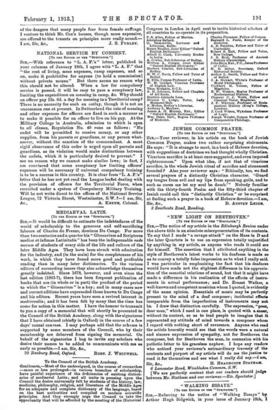"NEW LIGHT ON BEETHOVEN."
[TO THE EDITOR OF THE "SPECTATOR.")
Sirc,—The notice of my article in the Edinburgh Review under the above title is an absolute misrepresentation of its contents. To say that I made " a savage attack" on the Mass in D and the later Quartets is to use an expression totally unjustified by anything in my article, as anyone who reads it could see for himself. The assertion that I attributed anything in the style of Beethoven's latest works to his deafness is made so as to convey a totally false impression as to what I really said. I was particular in emphasizing the fact that his deafness would have made not the slightest difference in his apprecia- tion of the essential relations of sound, but that it might have made a difference in his realization of the effects of instru- ments in actual performance ; and Dr. Ernest Walker, a well-known and competent musician whom I quoted, is evidently of the same opinion. Essentials of music may be perfectly present to the mind of a deaf composer ; incidental effects inseparable from the imperfection of instruments may not be. I drew that distinction carefully. The expression, "poor, dear man," which I used in one place, is quoted with a sneer, without its context, so as to lead people to imagine that it represented my attitude of mind towards a composer whom I regard with nothing short of reverence. Anyone who read the article honestly would see that the words were a natural and sincere expression of sympathy, not for Beethoven the composer, but for Beethoven the man, in connexion with his pathetic letter to his graceless nephew. I hope any readers who noticed your reviewer's extraordinary travesty of the contents and purport of my article will do me the justice to read it for themselves and see what I really did say.—I am, [We are perfectly content that our readers should judge between Mr. Statham and our reviewer.—ED. Spectator.]










































 Previous page
Previous page